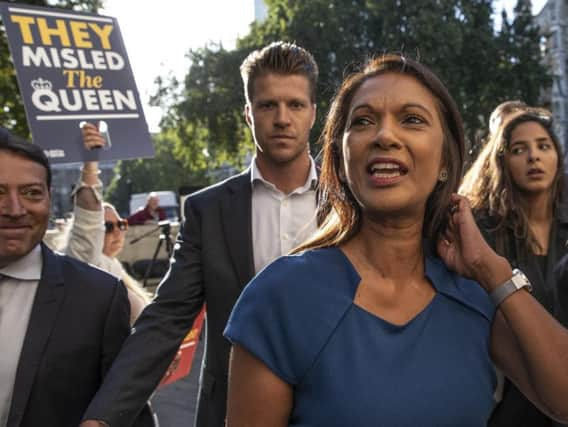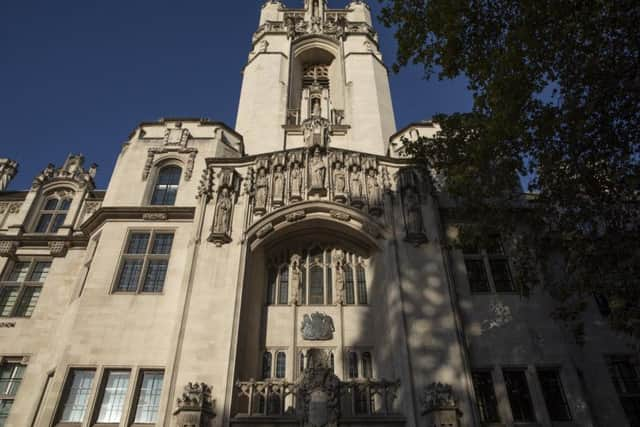Supreme Court: Who are the justices? When will they rule? How will Boris Johnson respond?


It is a landmark case in constitutional law and a major test for a Prime Minister in the first few month's of his term.
At 10.30am the Supreme Court will issue its findings on two appeals from separate legal challenges to the suspension of parliament brought in England and Scotland.
We answer some of your key questions:


What is the Supreme Court deciding?
Advertisement
Hide AdAdvertisement
Hide AdThe High Court in London dismissed a case brought by businesswoman and campaigner Gina Miller, finding that the length of the prorogation was a "purely political" matter and not one for judges to decide.
But the Inner House of the Court of Session in Edinburgh ruled that Mr Johnson's decision was unlawful because "it was motivated by the improper purpose of stymieing Parliament".
The Supreme Court justices heard appeals against both decisions last week and will announce their ruling on the matters tomorrow.
What can the judges rule upon?
At the close of the unprecedented three-day hearing last Thursday, the court's president Lady Hale said the ruling was not on the UK's Brexit terms, but on the question of the lawfulness of prorogation.
She said: "I must repeat that this case is not about when and on what terms the United Kingdom leaves the European Union.
"The result of this case will not determine that. We are solely concerned with the lawfulness of the Prime Minister's decision to advise Her Majesty to prorogue Parliament on the dates in question.
"As we have heard, it is not a simple question and we will now carefully consider all the arguments that have been presented to us."
Could the Prime Minister just prorogue Parliament again?
Depending on the legal basis upon which the judges reach their conclusions, Parliament may have to reconvene if Mr Johnson - who has refused to rule out a second suspension - loses the case.
Advertisement
Hide AdAdvertisement
Hide AdIf they side with the decision of the High Court and rule that judges have no place in interfering with purely political matters, then the suspension of Parliament will continue until October 14 and the Prime Minister can breathe a sigh of relief.
What are the possible scenarios?
Documents submitted to the court revealed three possible scenarios in the event the court rules the suspension was unlawful, two of which could see the Prime Minister make a fresh decision to prorogue Parliament.
The other outcome could see the court order Parliament to be recalled, but Mr Johnson's lawyers urged the judges to consider the "very serious practical consequences" involved in this option, as it would require a new Queen's Speech and State Opening of Parliament.
Lawyers for Mr Johnson's opponents said Parliament should meet "urgently" after the ruling to decide what to do in the event the prorogation is declared "null" by the court.
What is Mr Johnson's position and that of his opponents?
The Prime Minister advised the Queen on August 28 to prorogue Parliament for five weeks and it was suspended on September 9.
Mr Johnson says the five-week suspension is to allow the Government to set out a new legislative agenda in a Queen's Speech when MPs return to Parliament on October 14.
But those who brought the legal challenges argue the prorogation is designed to prevent parliamentary scrutiny of the UK's impending exit from the EU on October 31.
Will the Prime Minister be present for the findings?
No. Mr Johnson is currently in New York, where he is to meet US President Donald Trump on Tuesday for talks at the United Nations General Assembly, where he will also meet key EU leaders.
Advertisement
Hide AdAdvertisement
Hide AdWhen asked shortly after the hearing ended to rule out proroguing Parliament for a second time, Mr Johnson said: "I have the greatest respect for the judiciary in this country.
"The best thing I can say at the moment whilst their deliberations are continuing is that obviously I agree very much with the Master of the Rolls and the Lord Chief Justice and others who found in our favour the other day."
He added: "I will wait to see what transpires."
The timing of the announcement could also prove difficult for Labour MPs attending the party's annual conference in Brighton.
Who are the key figures in the case?
Gina Miller: An investment fund manager and campaigner who first came to public prominence in 2016 when she won a legal challenge against then Prime Minister Theresa May's decision to trigger Article 50. Mrs Miller brought an unsuccessful case against the prorogation through the English courts and is now appealing.
Sir John Major: Served as Prime Minister between 1990 and 1997. Condemned Boris Johnson's decision to prorogue Parliament and said he would bring a judicial review. However Sir John himself controversially prorogued Parliament ahead of the 1997 general election which prevented a report on the cash for questions scandal being considered.
Joanna Cherry QC MP and others: Joanna Cherry, a barrister-turned-MP and the SNP's justice and home affairs spokeswoman, is the lead claimant in the proceedings brought in Scotland. The case is brought by a total of 79 petitioners, including Lib Dem leader Jo Swinson, Green Party MP Caroline Lucas and Plaid Cymru's Westminster leader Liz Saville Roberts.
Their barrister Aidan O'Neill QC urged the 11 justices to "stand up for democracy", adding: "What we have with prorogation is the mother of parliaments closed down by the father of lies. Lies have consequences - but the truth will set us free."
Lady Hale: President of the Supreme Court and the more senior justice among the 11 hearing the two appeal cases. This is only the second time the full 11-strong panel has heard a case. The first instance was the Gina Miller challenge to Article 50. Lady Hale is standing down in January and will be replaced by her deputy, Lord Reed.